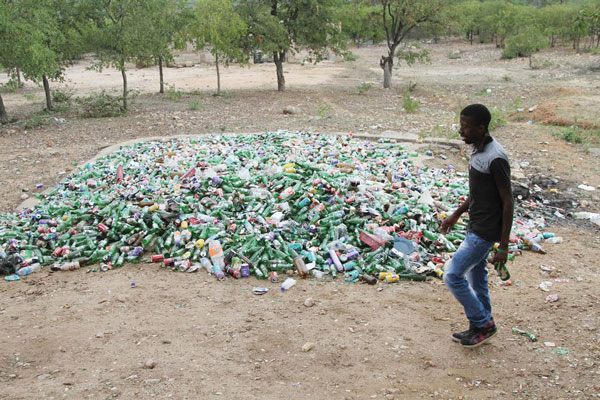
The sale and distribution of alcohol is regulated by strict laws. It is widely accepted that there is need to curb and control the trade and consumption of alcohol because of its far-reaching consequences to individuals and communities at large. The liquor laws of different countries throughout history makes for interesting reading.
Rights: MIRIAM TOSE MAJOME

Governments and, mostly, religious groups have felt a need to control or even ban the production, trade and consumption of alcohol. Alcohol has been used and abused as a political and power tool throughout history.
In some Islamic countries, such as Kuwait, Saudi Arabia, Afghanistan and others, the production, trade and consumption of alcohol is strictly prohibited. In some Islamic countries like Dubai, there are very restrictive laws even though it is not outrightly banned. In America, for about two decades up to the 1930s, there was a futile attempt to prohibit the trade and consumption of alcohol.
In Southern Rhodesia, during the times of the Federation, there were very restrictive laws on alcohol sales and consumption by black people. Black Africans were not allowed to drink European alcohol, which was predominantly the clear types of liquors. These laws were eased gradually over time when the segregation became more stratified as special drinking compounds in the townships, which still exist today, as council beer halls, were established. Liquor laws are relevant to consumers, sellers and distributors of alcoholic products as well as members of the public who for whatever reason are affected by the trade of alcohol.
The law
The Liquor Act Chapter 14:12 establishes a Liquor Licensing Board and confers powers and functions on the board and various officers in relation to licences. It permits and provides for the sale and supply of liquor, authorises the sale of refreshments and other articles, regulates the conduct of licensed premises, provides for restrictions on the recovery of debts related to the supply of liquor related matters. Alcohol refers to a number of products, which contain alcohol such as beer, ale, stout, hop beer and traditional beer, spirits such as whiskey, gin, brandy, cane and generally any fermented, distilled, spirituous or malted liquor containing more than 2,7% of absolute alcohol, but that are not perfumes or medicated spirits.
The Liquor Licensing Board
- Chamisa under fire over US$120K donation
- Mavhunga puts DeMbare into Chibuku quarterfinals
- Pension funds bet on Cabora Bassa oilfields
- Councils defy govt fire tender directive
Keep Reading
All people or organisations intending to sell and distribute liquor are required to have a liquor licence. It is an offence to operate an unregistered and unlicensed operation that sells and distributes alcohol. Shebeens and other backyard operations routinely play cat and mouse games with law enforcement agents because they do not have licences. Applications are made to the board, which works with local issuing authorities in the different provinces. The board has the discretion to grant licences or decline applications. Applicants may appear personally before the board to justify their application or can be represented by a legal practitioner or an authorised officer or member of a club or association.
Lodging objections
Members of the public have a right to complain and lodge complaints against applications for liquor licences or existing licences. The sale and consumption of alcohol has undeniable far-reaching consequences in communities in which it is sold. A community may likely experience increased consumption of alcohol, which usually results in an increase of social problems. It is likely there will be an unwelcome increase of vehicular traffic, litter, social vices like prostitution, muggings and noise. There will also be a likely depreciation of property values in the affected neighbourhoods. Nobody wants to buy a house or operate a business near a beerhall if they can help it so house prices in those areas tend to be lower than in other areas. Application notices are published in the Government Gazette and newspapers for the purpose of notifying the public to lodge objections if they wish. Interested and affected parties are encouraged to be vigilant and oppose the granting of licences before they are granted.
In the past few years, drinking places have mushroomed and multiplied almost everywhere at a rate only matched by new church establishments. Only a few active citizens have challenged these liquor licences, but with limited success. In 2015, one Harare resident put up a brave and spirited, but futile fight to try and stop the restaurant Cassa Mia from continuing to operate in his neighbourhood in Avondale.
Anyone wishing to lodge an objection is required to make a written objection stating the reasons and the Liquor Licensing Board will deliberate on the objections and give a response. Even if a licence has been already been granted and is in operation people can still lodge objections at their own instance to the board or on behalf of others. The board hears matters pertaining to the control of liquor or distribution and the desirability of reducing or increasing the number of licenced outlets in an area. There is nothing like waking up to find a bar or night club open in your quiet neighbourhood or yet another new one in an already over-subscribed area. On good cause shown the board can cancel or suspend licences or vary or amend the conditions of issue or impose new conditions.
Miriam Tose Majome is a lawyer and a teacher. She can be contacted on [email protected]












